Derivative & Portfolio Management: Investment Environments Report
VerifiedAdded on 2020/03/01
|17
|3552
|50
Report
AI Summary
This report delves into the critical role of derivatives in portfolio management, emphasizing risk minimization within the investment landscape. It explores the four major derivatives—forward, future, option contracts, and swaps—and their significance in hedging against market volatility. The report then presents a comparative analysis of investment environments in China and South Africa, two key players in the global economy. The discussion covers factors boosting investment, market conditions, and the advantages and disadvantages of investing in each country. The report highlights the importance of China's large consumer market and advanced infrastructure, while also acknowledging the influence of political factors and currency volatility. In the case of South Africa, it examines the share market conditions, investment facts, and potential investment sectors. The report concludes by summarizing the key findings and emphasizing the importance of understanding both the opportunities and the risks associated with investment in these dynamic economies.
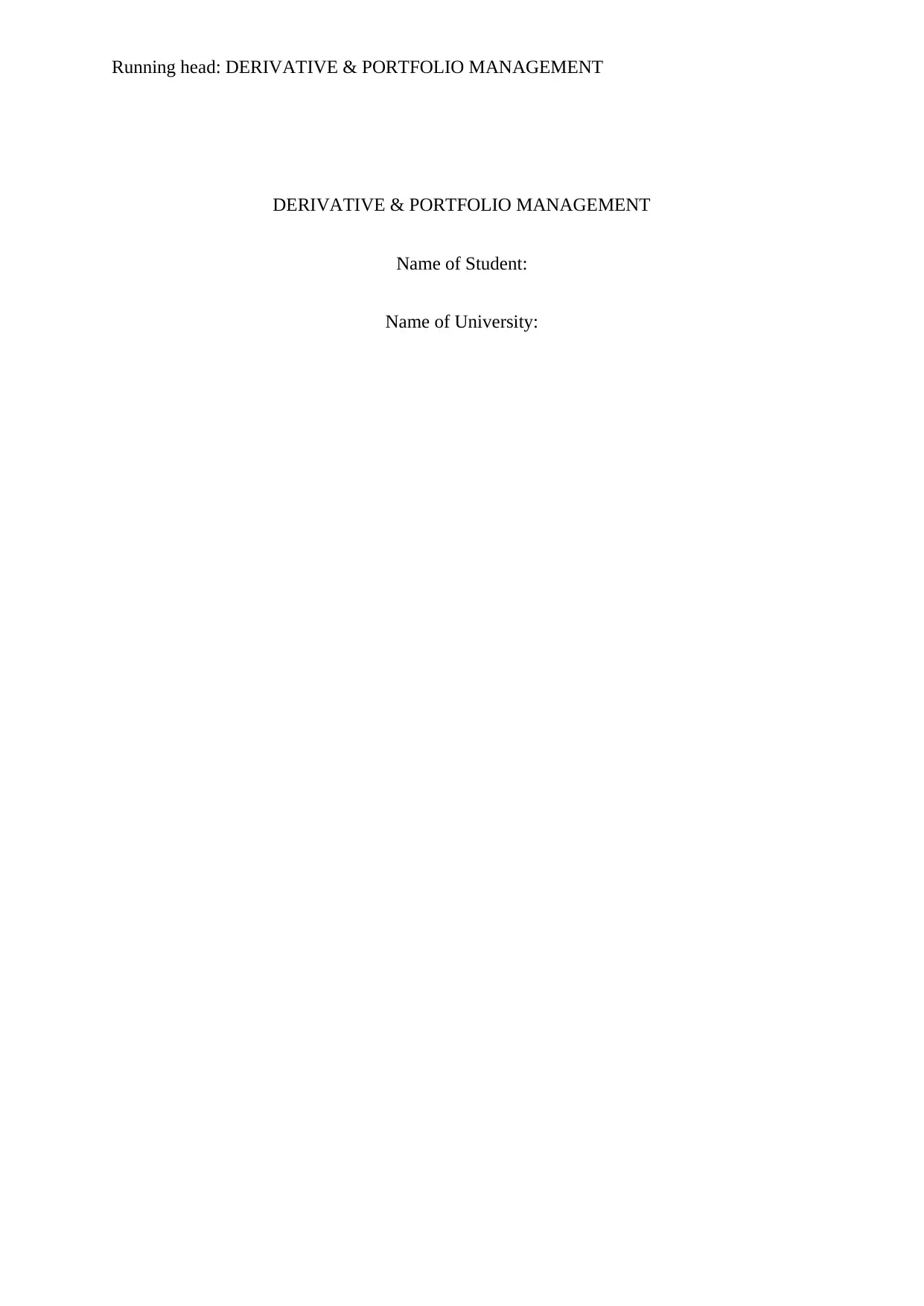
Running head: DERIVATIVE & PORTFOLIO MANAGEMENT
DERIVATIVE & PORTFOLIO MANAGEMENT
Name of Student:
Name of University:
DERIVATIVE & PORTFOLIO MANAGEMENT
Name of Student:
Name of University:
Paraphrase This Document
Need a fresh take? Get an instant paraphrase of this document with our AI Paraphraser
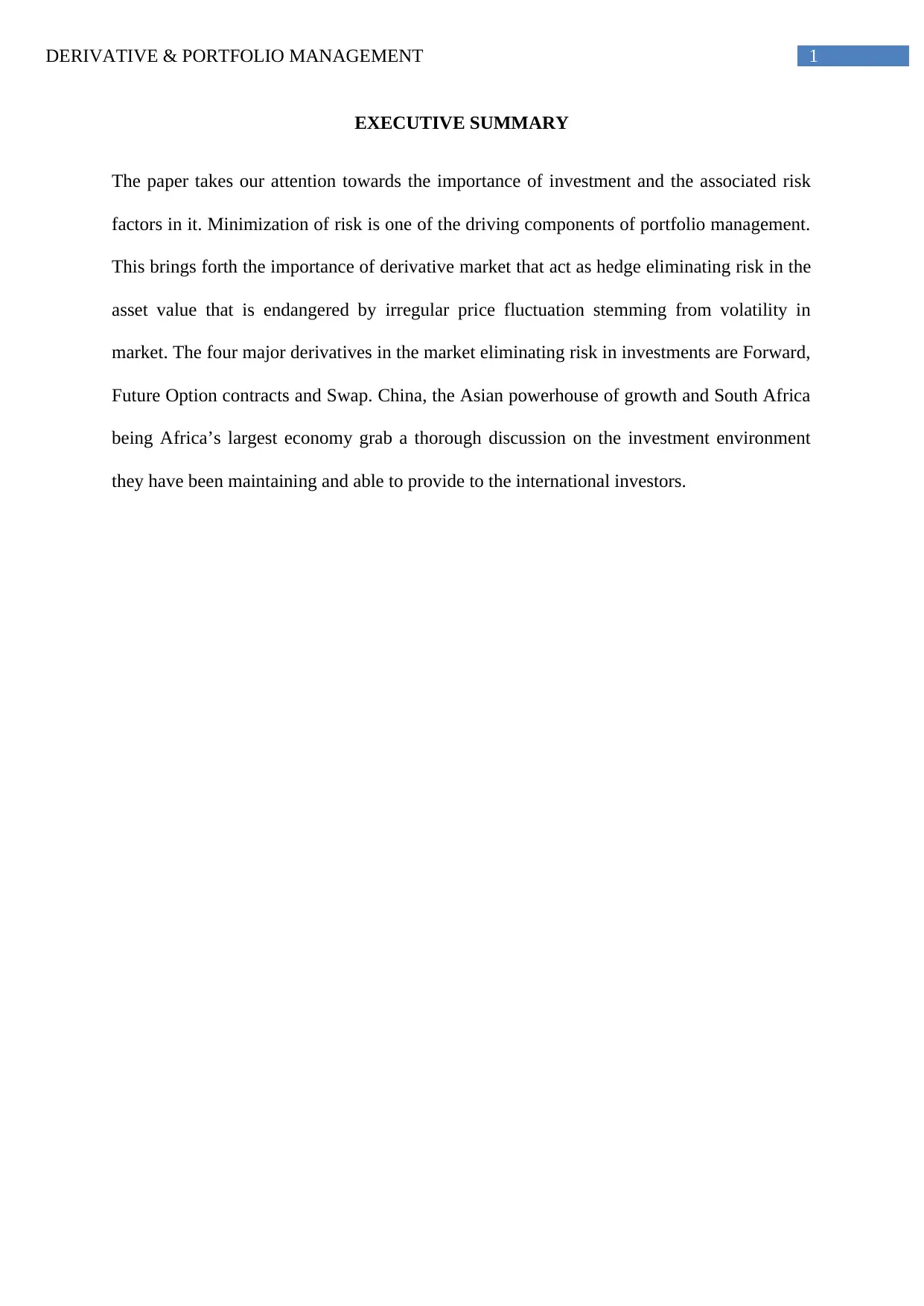
1DERIVATIVE & PORTFOLIO MANAGEMENT
EXECUTIVE SUMMARY
The paper takes our attention towards the importance of investment and the associated risk
factors in it. Minimization of risk is one of the driving components of portfolio management.
This brings forth the importance of derivative market that act as hedge eliminating risk in the
asset value that is endangered by irregular price fluctuation stemming from volatility in
market. The four major derivatives in the market eliminating risk in investments are Forward,
Future Option contracts and Swap. China, the Asian powerhouse of growth and South Africa
being Africa’s largest economy grab a thorough discussion on the investment environment
they have been maintaining and able to provide to the international investors.
EXECUTIVE SUMMARY
The paper takes our attention towards the importance of investment and the associated risk
factors in it. Minimization of risk is one of the driving components of portfolio management.
This brings forth the importance of derivative market that act as hedge eliminating risk in the
asset value that is endangered by irregular price fluctuation stemming from volatility in
market. The four major derivatives in the market eliminating risk in investments are Forward,
Future Option contracts and Swap. China, the Asian powerhouse of growth and South Africa
being Africa’s largest economy grab a thorough discussion on the investment environment
they have been maintaining and able to provide to the international investors.
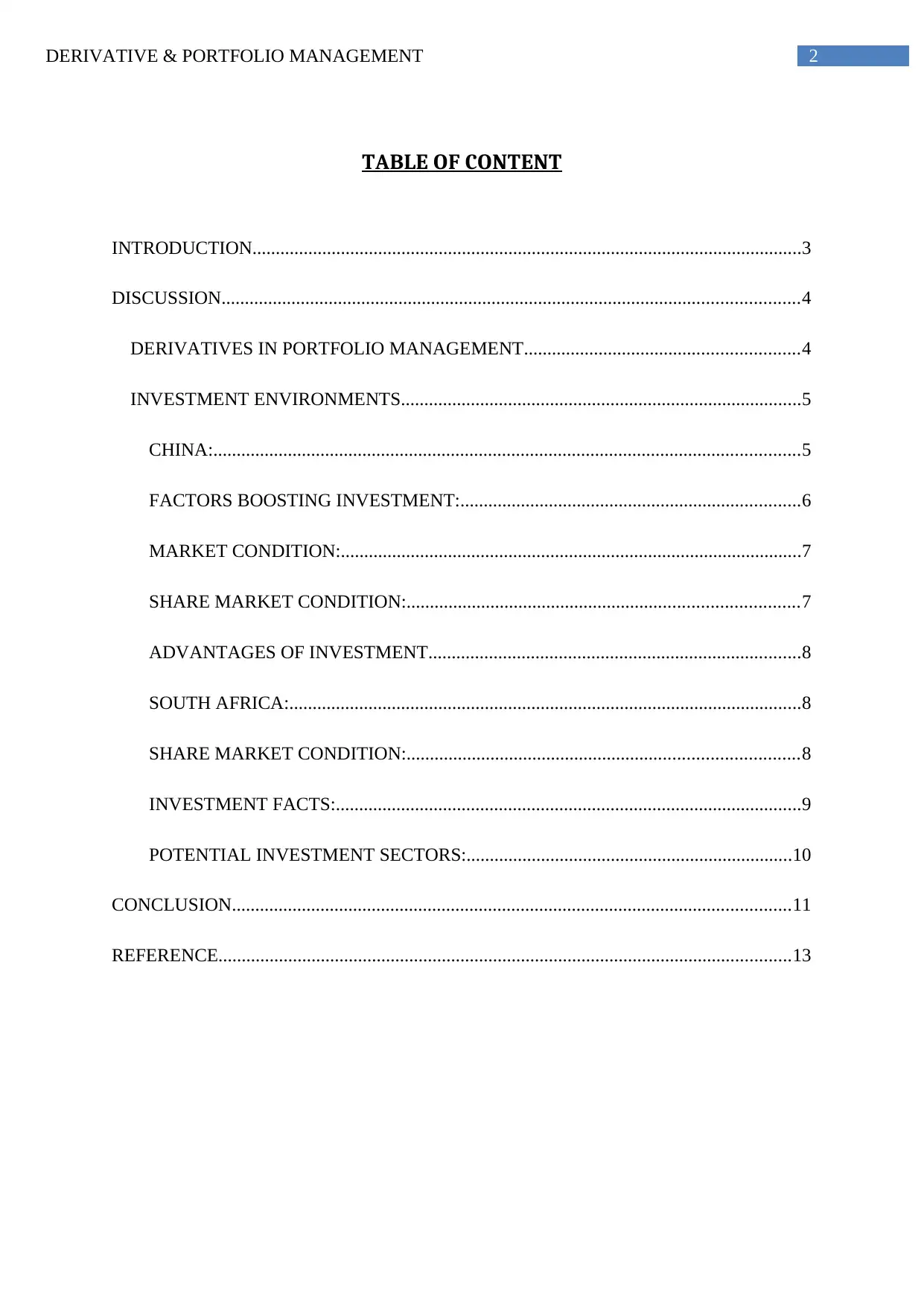
2DERIVATIVE & PORTFOLIO MANAGEMENT
TABLE OF CONTENT
INTRODUCTION......................................................................................................................3
DISCUSSION............................................................................................................................4
DERIVATIVES IN PORTFOLIO MANAGEMENT...........................................................4
INVESTMENT ENVIRONMENTS......................................................................................5
CHINA:..............................................................................................................................5
FACTORS BOOSTING INVESTMENT:.........................................................................6
MARKET CONDITION:...................................................................................................7
SHARE MARKET CONDITION:....................................................................................7
ADVANTAGES OF INVESTMENT................................................................................8
SOUTH AFRICA:..............................................................................................................8
SHARE MARKET CONDITION:....................................................................................8
INVESTMENT FACTS:....................................................................................................9
POTENTIAL INVESTMENT SECTORS:......................................................................10
CONCLUSION........................................................................................................................11
REFERENCE...........................................................................................................................13
TABLE OF CONTENT
INTRODUCTION......................................................................................................................3
DISCUSSION............................................................................................................................4
DERIVATIVES IN PORTFOLIO MANAGEMENT...........................................................4
INVESTMENT ENVIRONMENTS......................................................................................5
CHINA:..............................................................................................................................5
FACTORS BOOSTING INVESTMENT:.........................................................................6
MARKET CONDITION:...................................................................................................7
SHARE MARKET CONDITION:....................................................................................7
ADVANTAGES OF INVESTMENT................................................................................8
SOUTH AFRICA:..............................................................................................................8
SHARE MARKET CONDITION:....................................................................................8
INVESTMENT FACTS:....................................................................................................9
POTENTIAL INVESTMENT SECTORS:......................................................................10
CONCLUSION........................................................................................................................11
REFERENCE...........................................................................................................................13
⊘ This is a preview!⊘
Do you want full access?
Subscribe today to unlock all pages.

Trusted by 1+ million students worldwide
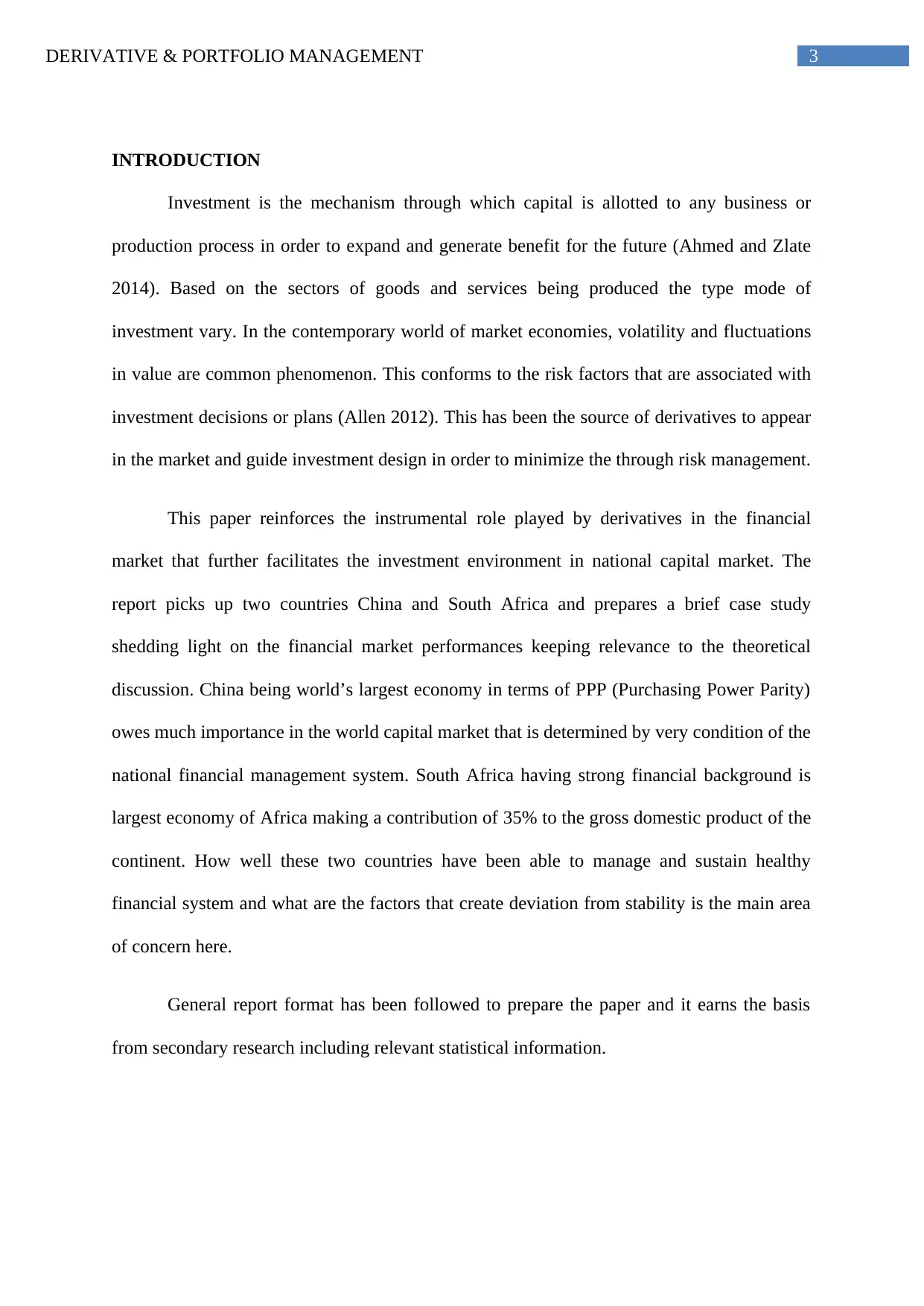
3DERIVATIVE & PORTFOLIO MANAGEMENT
INTRODUCTION
Investment is the mechanism through which capital is allotted to any business or
production process in order to expand and generate benefit for the future (Ahmed and Zlate
2014). Based on the sectors of goods and services being produced the type mode of
investment vary. In the contemporary world of market economies, volatility and fluctuations
in value are common phenomenon. This conforms to the risk factors that are associated with
investment decisions or plans (Allen 2012). This has been the source of derivatives to appear
in the market and guide investment design in order to minimize the through risk management.
This paper reinforces the instrumental role played by derivatives in the financial
market that further facilitates the investment environment in national capital market. The
report picks up two countries China and South Africa and prepares a brief case study
shedding light on the financial market performances keeping relevance to the theoretical
discussion. China being world’s largest economy in terms of PPP (Purchasing Power Parity)
owes much importance in the world capital market that is determined by very condition of the
national financial management system. South Africa having strong financial background is
largest economy of Africa making a contribution of 35% to the gross domestic product of the
continent. How well these two countries have been able to manage and sustain healthy
financial system and what are the factors that create deviation from stability is the main area
of concern here.
General report format has been followed to prepare the paper and it earns the basis
from secondary research including relevant statistical information.
INTRODUCTION
Investment is the mechanism through which capital is allotted to any business or
production process in order to expand and generate benefit for the future (Ahmed and Zlate
2014). Based on the sectors of goods and services being produced the type mode of
investment vary. In the contemporary world of market economies, volatility and fluctuations
in value are common phenomenon. This conforms to the risk factors that are associated with
investment decisions or plans (Allen 2012). This has been the source of derivatives to appear
in the market and guide investment design in order to minimize the through risk management.
This paper reinforces the instrumental role played by derivatives in the financial
market that further facilitates the investment environment in national capital market. The
report picks up two countries China and South Africa and prepares a brief case study
shedding light on the financial market performances keeping relevance to the theoretical
discussion. China being world’s largest economy in terms of PPP (Purchasing Power Parity)
owes much importance in the world capital market that is determined by very condition of the
national financial management system. South Africa having strong financial background is
largest economy of Africa making a contribution of 35% to the gross domestic product of the
continent. How well these two countries have been able to manage and sustain healthy
financial system and what are the factors that create deviation from stability is the main area
of concern here.
General report format has been followed to prepare the paper and it earns the basis
from secondary research including relevant statistical information.
Paraphrase This Document
Need a fresh take? Get an instant paraphrase of this document with our AI Paraphraser
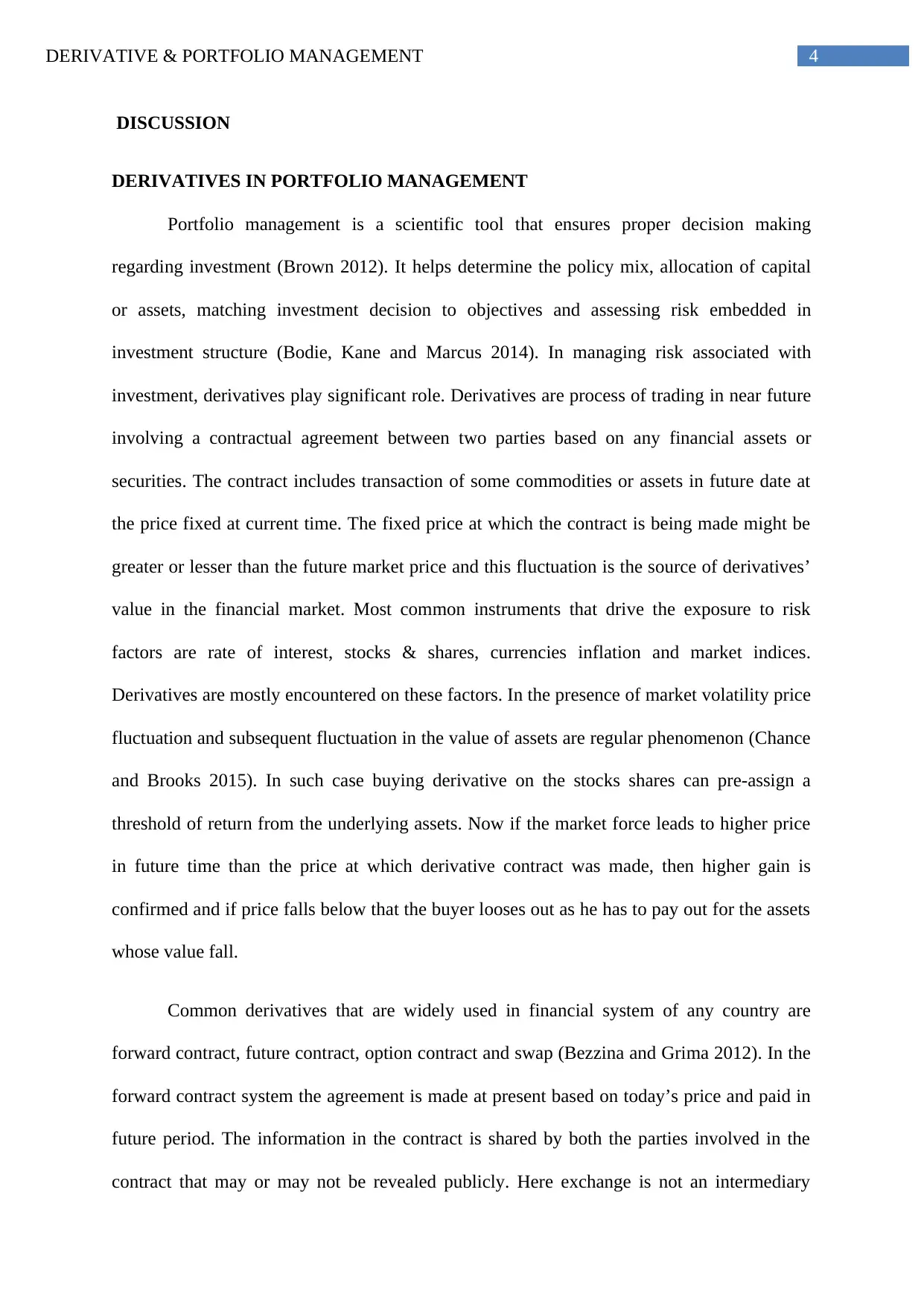
4DERIVATIVE & PORTFOLIO MANAGEMENT
DISCUSSION
DERIVATIVES IN PORTFOLIO MANAGEMENT
Portfolio management is a scientific tool that ensures proper decision making
regarding investment (Brown 2012). It helps determine the policy mix, allocation of capital
or assets, matching investment decision to objectives and assessing risk embedded in
investment structure (Bodie, Kane and Marcus 2014). In managing risk associated with
investment, derivatives play significant role. Derivatives are process of trading in near future
involving a contractual agreement between two parties based on any financial assets or
securities. The contract includes transaction of some commodities or assets in future date at
the price fixed at current time. The fixed price at which the contract is being made might be
greater or lesser than the future market price and this fluctuation is the source of derivatives’
value in the financial market. Most common instruments that drive the exposure to risk
factors are rate of interest, stocks & shares, currencies inflation and market indices.
Derivatives are mostly encountered on these factors. In the presence of market volatility price
fluctuation and subsequent fluctuation in the value of assets are regular phenomenon (Chance
and Brooks 2015). In such case buying derivative on the stocks shares can pre-assign a
threshold of return from the underlying assets. Now if the market force leads to higher price
in future time than the price at which derivative contract was made, then higher gain is
confirmed and if price falls below that the buyer looses out as he has to pay out for the assets
whose value fall.
Common derivatives that are widely used in financial system of any country are
forward contract, future contract, option contract and swap (Bezzina and Grima 2012). In the
forward contract system the agreement is made at present based on today’s price and paid in
future period. The information in the contract is shared by both the parties involved in the
contract that may or may not be revealed publicly. Here exchange is not an intermediary
DISCUSSION
DERIVATIVES IN PORTFOLIO MANAGEMENT
Portfolio management is a scientific tool that ensures proper decision making
regarding investment (Brown 2012). It helps determine the policy mix, allocation of capital
or assets, matching investment decision to objectives and assessing risk embedded in
investment structure (Bodie, Kane and Marcus 2014). In managing risk associated with
investment, derivatives play significant role. Derivatives are process of trading in near future
involving a contractual agreement between two parties based on any financial assets or
securities. The contract includes transaction of some commodities or assets in future date at
the price fixed at current time. The fixed price at which the contract is being made might be
greater or lesser than the future market price and this fluctuation is the source of derivatives’
value in the financial market. Most common instruments that drive the exposure to risk
factors are rate of interest, stocks & shares, currencies inflation and market indices.
Derivatives are mostly encountered on these factors. In the presence of market volatility price
fluctuation and subsequent fluctuation in the value of assets are regular phenomenon (Chance
and Brooks 2015). In such case buying derivative on the stocks shares can pre-assign a
threshold of return from the underlying assets. Now if the market force leads to higher price
in future time than the price at which derivative contract was made, then higher gain is
confirmed and if price falls below that the buyer looses out as he has to pay out for the assets
whose value fall.
Common derivatives that are widely used in financial system of any country are
forward contract, future contract, option contract and swap (Bezzina and Grima 2012). In the
forward contract system the agreement is made at present based on today’s price and paid in
future period. The information in the contract is shared by both the parties involved in the
contract that may or may not be revealed publicly. Here exchange is not an intermediary
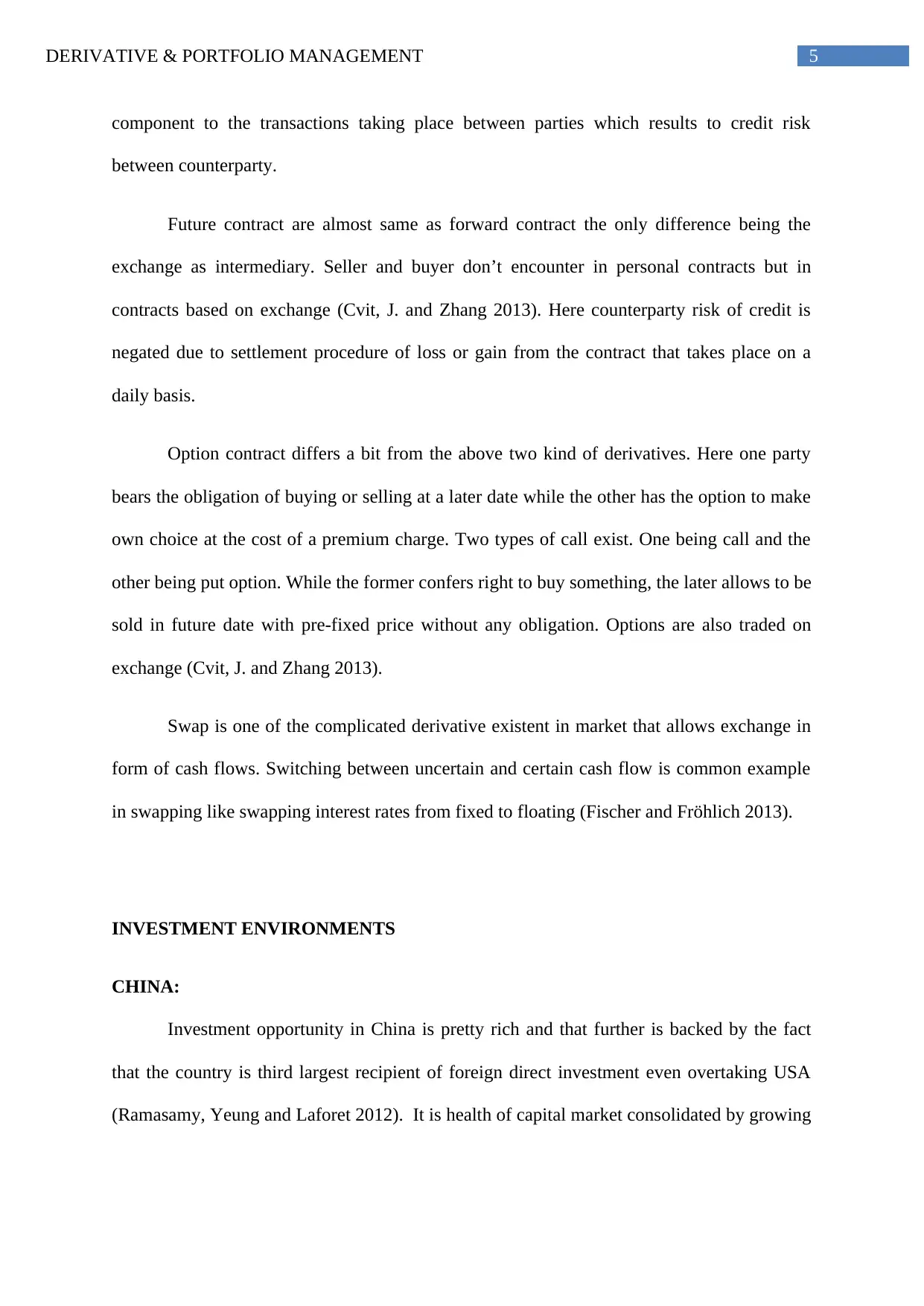
5DERIVATIVE & PORTFOLIO MANAGEMENT
component to the transactions taking place between parties which results to credit risk
between counterparty.
Future contract are almost same as forward contract the only difference being the
exchange as intermediary. Seller and buyer don’t encounter in personal contracts but in
contracts based on exchange (Cvit, J. and Zhang 2013). Here counterparty risk of credit is
negated due to settlement procedure of loss or gain from the contract that takes place on a
daily basis.
Option contract differs a bit from the above two kind of derivatives. Here one party
bears the obligation of buying or selling at a later date while the other has the option to make
own choice at the cost of a premium charge. Two types of call exist. One being call and the
other being put option. While the former confers right to buy something, the later allows to be
sold in future date with pre-fixed price without any obligation. Options are also traded on
exchange (Cvit, J. and Zhang 2013).
Swap is one of the complicated derivative existent in market that allows exchange in
form of cash flows. Switching between uncertain and certain cash flow is common example
in swapping like swapping interest rates from fixed to floating (Fischer and Fröhlich 2013).
INVESTMENT ENVIRONMENTS
CHINA:
Investment opportunity in China is pretty rich and that further is backed by the fact
that the country is third largest recipient of foreign direct investment even overtaking USA
(Ramasamy, Yeung and Laforet 2012). It is health of capital market consolidated by growing
component to the transactions taking place between parties which results to credit risk
between counterparty.
Future contract are almost same as forward contract the only difference being the
exchange as intermediary. Seller and buyer don’t encounter in personal contracts but in
contracts based on exchange (Cvit, J. and Zhang 2013). Here counterparty risk of credit is
negated due to settlement procedure of loss or gain from the contract that takes place on a
daily basis.
Option contract differs a bit from the above two kind of derivatives. Here one party
bears the obligation of buying or selling at a later date while the other has the option to make
own choice at the cost of a premium charge. Two types of call exist. One being call and the
other being put option. While the former confers right to buy something, the later allows to be
sold in future date with pre-fixed price without any obligation. Options are also traded on
exchange (Cvit, J. and Zhang 2013).
Swap is one of the complicated derivative existent in market that allows exchange in
form of cash flows. Switching between uncertain and certain cash flow is common example
in swapping like swapping interest rates from fixed to floating (Fischer and Fröhlich 2013).
INVESTMENT ENVIRONMENTS
CHINA:
Investment opportunity in China is pretty rich and that further is backed by the fact
that the country is third largest recipient of foreign direct investment even overtaking USA
(Ramasamy, Yeung and Laforet 2012). It is health of capital market consolidated by growing
⊘ This is a preview!⊘
Do you want full access?
Subscribe today to unlock all pages.

Trusted by 1+ million students worldwide
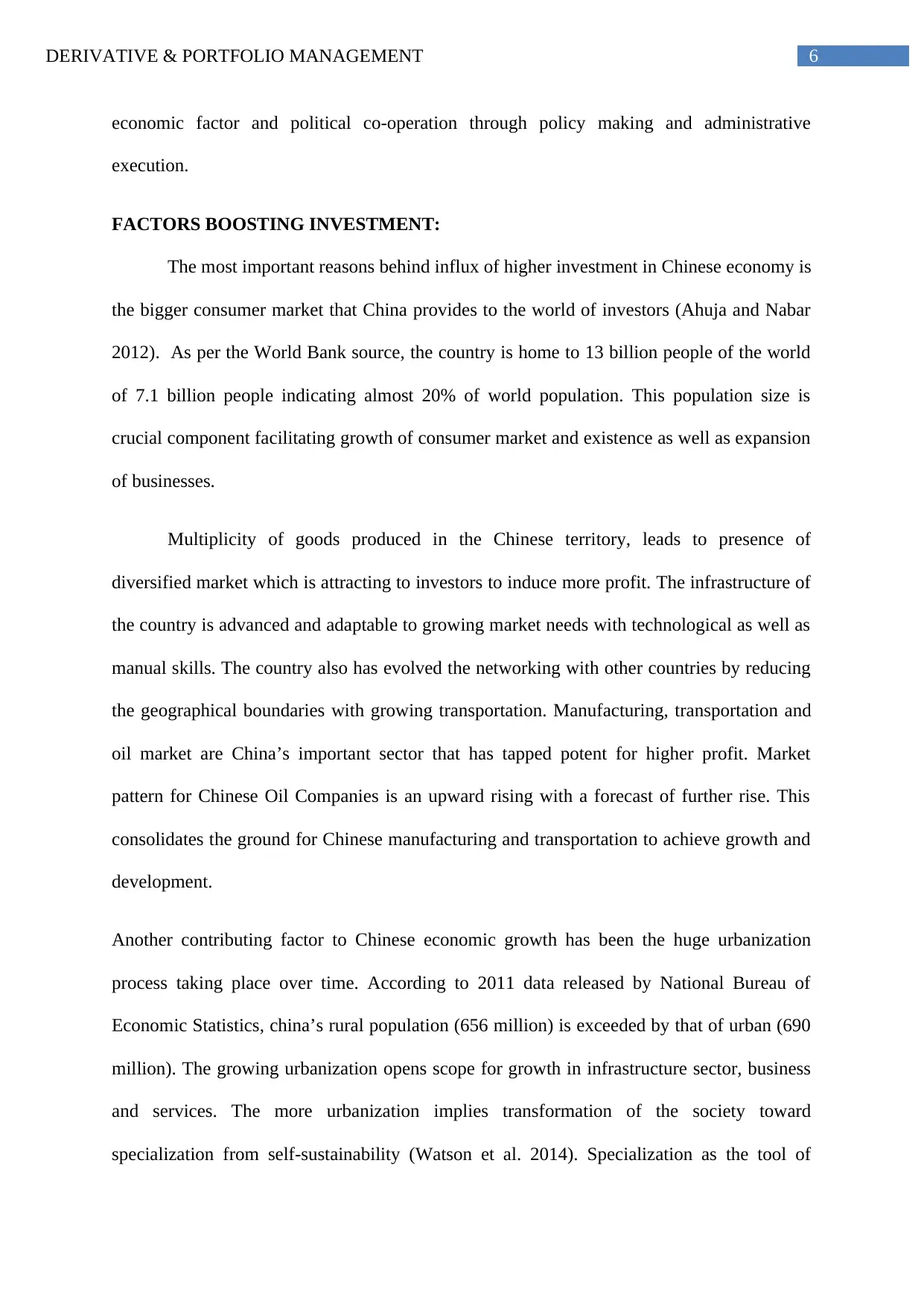
6DERIVATIVE & PORTFOLIO MANAGEMENT
economic factor and political co-operation through policy making and administrative
execution.
FACTORS BOOSTING INVESTMENT:
The most important reasons behind influx of higher investment in Chinese economy is
the bigger consumer market that China provides to the world of investors (Ahuja and Nabar
2012). As per the World Bank source, the country is home to 13 billion people of the world
of 7.1 billion people indicating almost 20% of world population. This population size is
crucial component facilitating growth of consumer market and existence as well as expansion
of businesses.
Multiplicity of goods produced in the Chinese territory, leads to presence of
diversified market which is attracting to investors to induce more profit. The infrastructure of
the country is advanced and adaptable to growing market needs with technological as well as
manual skills. The country also has evolved the networking with other countries by reducing
the geographical boundaries with growing transportation. Manufacturing, transportation and
oil market are China’s important sector that has tapped potent for higher profit. Market
pattern for Chinese Oil Companies is an upward rising with a forecast of further rise. This
consolidates the ground for Chinese manufacturing and transportation to achieve growth and
development.
Another contributing factor to Chinese economic growth has been the huge urbanization
process taking place over time. According to 2011 data released by National Bureau of
Economic Statistics, china’s rural population (656 million) is exceeded by that of urban (690
million). The growing urbanization opens scope for growth in infrastructure sector, business
and services. The more urbanization implies transformation of the society toward
specialization from self-sustainability (Watson et al. 2014). Specialization as the tool of
economic factor and political co-operation through policy making and administrative
execution.
FACTORS BOOSTING INVESTMENT:
The most important reasons behind influx of higher investment in Chinese economy is
the bigger consumer market that China provides to the world of investors (Ahuja and Nabar
2012). As per the World Bank source, the country is home to 13 billion people of the world
of 7.1 billion people indicating almost 20% of world population. This population size is
crucial component facilitating growth of consumer market and existence as well as expansion
of businesses.
Multiplicity of goods produced in the Chinese territory, leads to presence of
diversified market which is attracting to investors to induce more profit. The infrastructure of
the country is advanced and adaptable to growing market needs with technological as well as
manual skills. The country also has evolved the networking with other countries by reducing
the geographical boundaries with growing transportation. Manufacturing, transportation and
oil market are China’s important sector that has tapped potent for higher profit. Market
pattern for Chinese Oil Companies is an upward rising with a forecast of further rise. This
consolidates the ground for Chinese manufacturing and transportation to achieve growth and
development.
Another contributing factor to Chinese economic growth has been the huge urbanization
process taking place over time. According to 2011 data released by National Bureau of
Economic Statistics, china’s rural population (656 million) is exceeded by that of urban (690
million). The growing urbanization opens scope for growth in infrastructure sector, business
and services. The more urbanization implies transformation of the society toward
specialization from self-sustainability (Watson et al. 2014). Specialization as the tool of
Paraphrase This Document
Need a fresh take? Get an instant paraphrase of this document with our AI Paraphraser
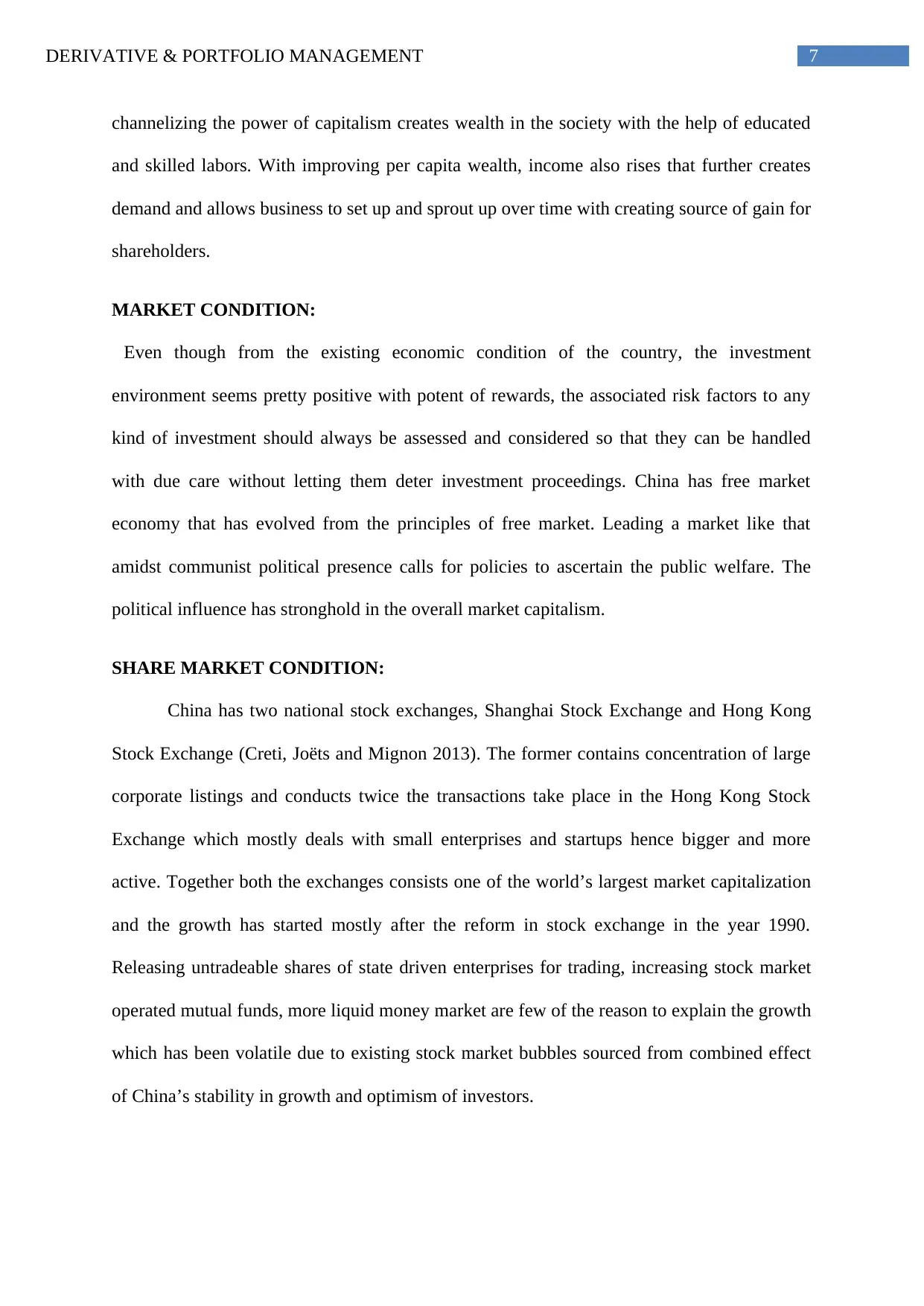
7DERIVATIVE & PORTFOLIO MANAGEMENT
channelizing the power of capitalism creates wealth in the society with the help of educated
and skilled labors. With improving per capita wealth, income also rises that further creates
demand and allows business to set up and sprout up over time with creating source of gain for
shareholders.
MARKET CONDITION:
Even though from the existing economic condition of the country, the investment
environment seems pretty positive with potent of rewards, the associated risk factors to any
kind of investment should always be assessed and considered so that they can be handled
with due care without letting them deter investment proceedings. China has free market
economy that has evolved from the principles of free market. Leading a market like that
amidst communist political presence calls for policies to ascertain the public welfare. The
political influence has stronghold in the overall market capitalism.
SHARE MARKET CONDITION:
China has two national stock exchanges, Shanghai Stock Exchange and Hong Kong
Stock Exchange (Creti, Joëts and Mignon 2013). The former contains concentration of large
corporate listings and conducts twice the transactions take place in the Hong Kong Stock
Exchange which mostly deals with small enterprises and startups hence bigger and more
active. Together both the exchanges consists one of the world’s largest market capitalization
and the growth has started mostly after the reform in stock exchange in the year 1990.
Releasing untradeable shares of state driven enterprises for trading, increasing stock market
operated mutual funds, more liquid money market are few of the reason to explain the growth
which has been volatile due to existing stock market bubbles sourced from combined effect
of China’s stability in growth and optimism of investors.
channelizing the power of capitalism creates wealth in the society with the help of educated
and skilled labors. With improving per capita wealth, income also rises that further creates
demand and allows business to set up and sprout up over time with creating source of gain for
shareholders.
MARKET CONDITION:
Even though from the existing economic condition of the country, the investment
environment seems pretty positive with potent of rewards, the associated risk factors to any
kind of investment should always be assessed and considered so that they can be handled
with due care without letting them deter investment proceedings. China has free market
economy that has evolved from the principles of free market. Leading a market like that
amidst communist political presence calls for policies to ascertain the public welfare. The
political influence has stronghold in the overall market capitalism.
SHARE MARKET CONDITION:
China has two national stock exchanges, Shanghai Stock Exchange and Hong Kong
Stock Exchange (Creti, Joëts and Mignon 2013). The former contains concentration of large
corporate listings and conducts twice the transactions take place in the Hong Kong Stock
Exchange which mostly deals with small enterprises and startups hence bigger and more
active. Together both the exchanges consists one of the world’s largest market capitalization
and the growth has started mostly after the reform in stock exchange in the year 1990.
Releasing untradeable shares of state driven enterprises for trading, increasing stock market
operated mutual funds, more liquid money market are few of the reason to explain the growth
which has been volatile due to existing stock market bubbles sourced from combined effect
of China’s stability in growth and optimism of investors.
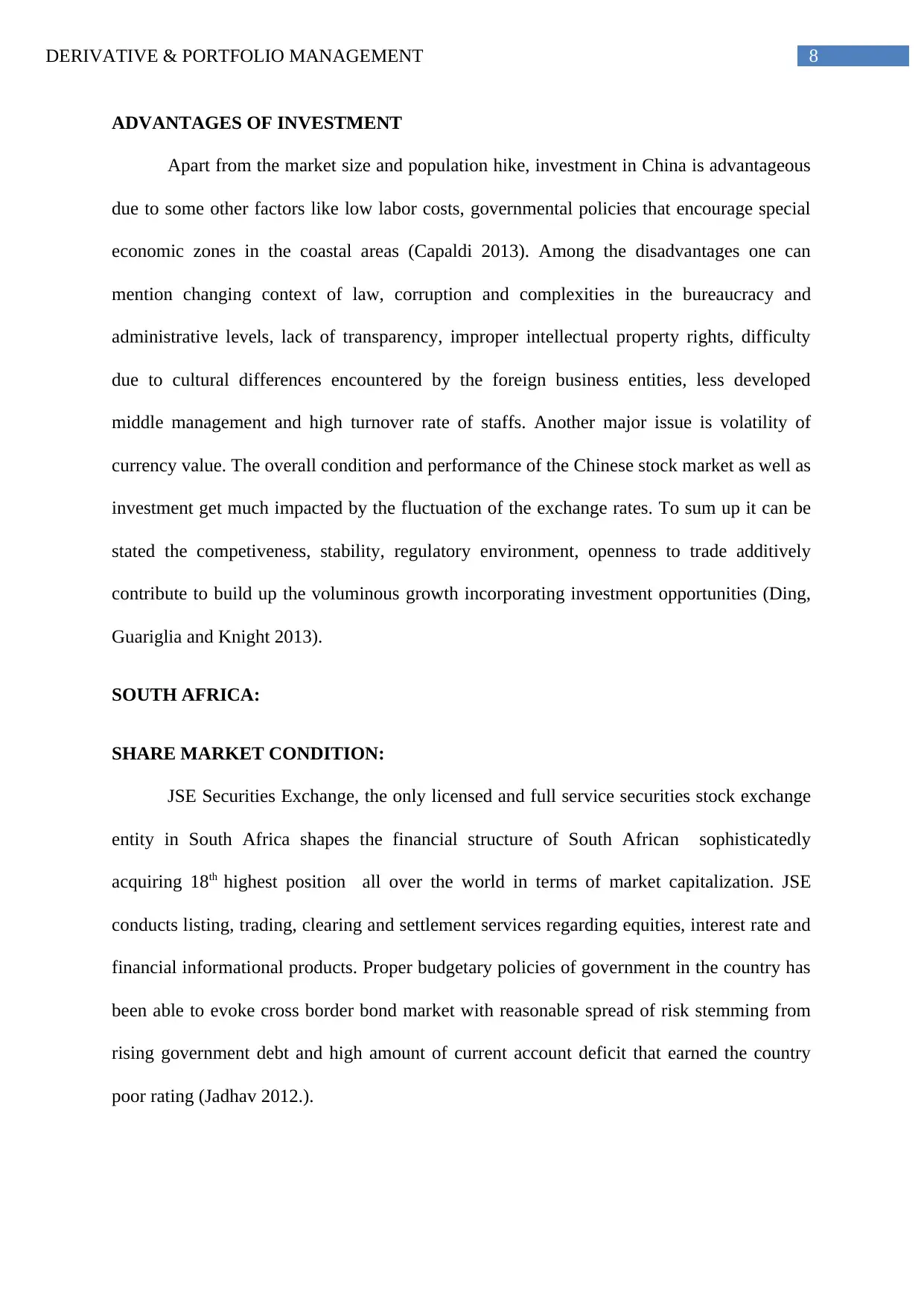
8DERIVATIVE & PORTFOLIO MANAGEMENT
ADVANTAGES OF INVESTMENT
Apart from the market size and population hike, investment in China is advantageous
due to some other factors like low labor costs, governmental policies that encourage special
economic zones in the coastal areas (Capaldi 2013). Among the disadvantages one can
mention changing context of law, corruption and complexities in the bureaucracy and
administrative levels, lack of transparency, improper intellectual property rights, difficulty
due to cultural differences encountered by the foreign business entities, less developed
middle management and high turnover rate of staffs. Another major issue is volatility of
currency value. The overall condition and performance of the Chinese stock market as well as
investment get much impacted by the fluctuation of the exchange rates. To sum up it can be
stated the competiveness, stability, regulatory environment, openness to trade additively
contribute to build up the voluminous growth incorporating investment opportunities (Ding,
Guariglia and Knight 2013).
SOUTH AFRICA:
SHARE MARKET CONDITION:
JSE Securities Exchange, the only licensed and full service securities stock exchange
entity in South Africa shapes the financial structure of South African sophisticatedly
acquiring 18th highest position all over the world in terms of market capitalization. JSE
conducts listing, trading, clearing and settlement services regarding equities, interest rate and
financial informational products. Proper budgetary policies of government in the country has
been able to evoke cross border bond market with reasonable spread of risk stemming from
rising government debt and high amount of current account deficit that earned the country
poor rating (Jadhav 2012.).
ADVANTAGES OF INVESTMENT
Apart from the market size and population hike, investment in China is advantageous
due to some other factors like low labor costs, governmental policies that encourage special
economic zones in the coastal areas (Capaldi 2013). Among the disadvantages one can
mention changing context of law, corruption and complexities in the bureaucracy and
administrative levels, lack of transparency, improper intellectual property rights, difficulty
due to cultural differences encountered by the foreign business entities, less developed
middle management and high turnover rate of staffs. Another major issue is volatility of
currency value. The overall condition and performance of the Chinese stock market as well as
investment get much impacted by the fluctuation of the exchange rates. To sum up it can be
stated the competiveness, stability, regulatory environment, openness to trade additively
contribute to build up the voluminous growth incorporating investment opportunities (Ding,
Guariglia and Knight 2013).
SOUTH AFRICA:
SHARE MARKET CONDITION:
JSE Securities Exchange, the only licensed and full service securities stock exchange
entity in South Africa shapes the financial structure of South African sophisticatedly
acquiring 18th highest position all over the world in terms of market capitalization. JSE
conducts listing, trading, clearing and settlement services regarding equities, interest rate and
financial informational products. Proper budgetary policies of government in the country has
been able to evoke cross border bond market with reasonable spread of risk stemming from
rising government debt and high amount of current account deficit that earned the country
poor rating (Jadhav 2012.).
⊘ This is a preview!⊘
Do you want full access?
Subscribe today to unlock all pages.

Trusted by 1+ million students worldwide
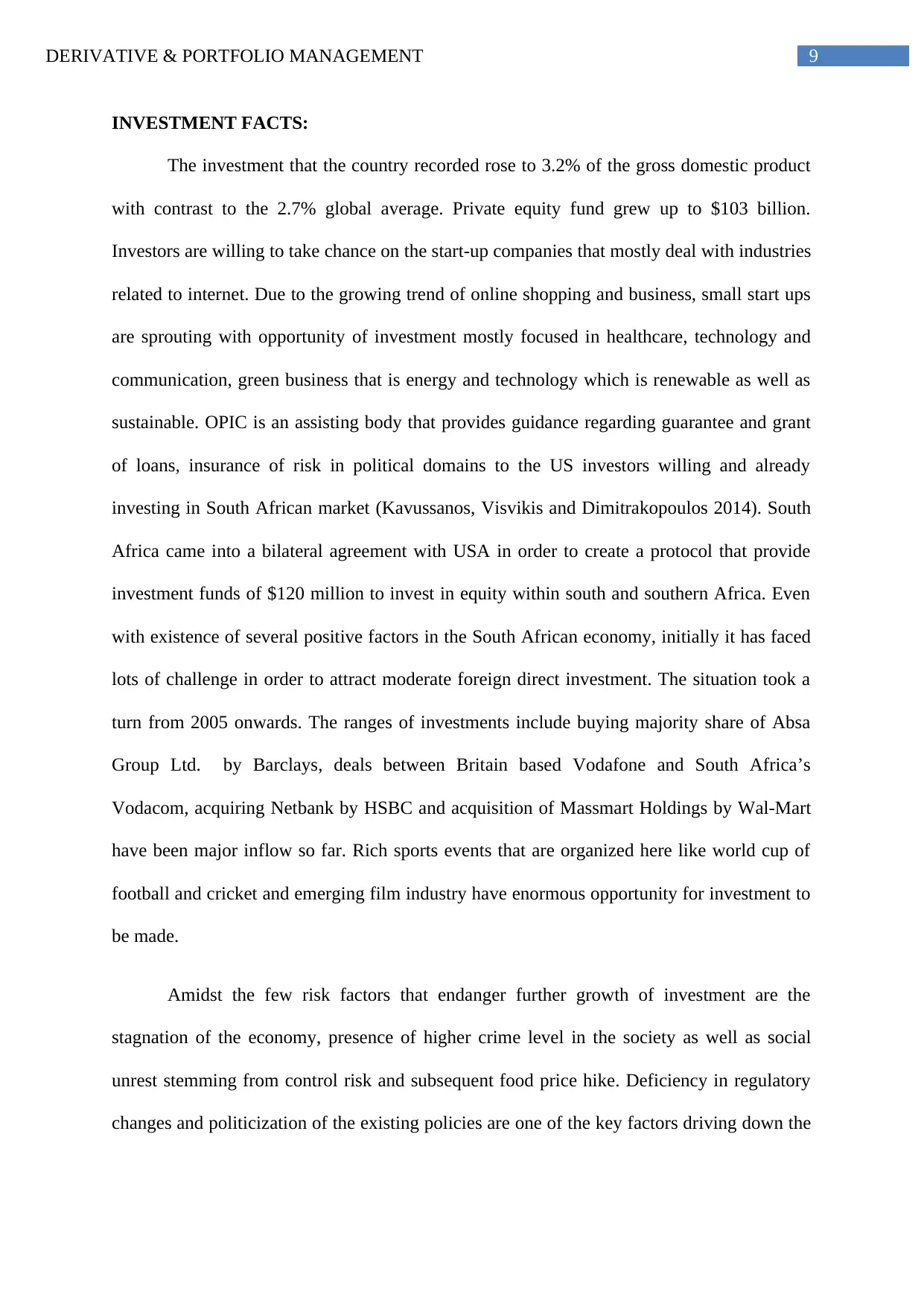
9DERIVATIVE & PORTFOLIO MANAGEMENT
INVESTMENT FACTS:
The investment that the country recorded rose to 3.2% of the gross domestic product
with contrast to the 2.7% global average. Private equity fund grew up to $103 billion.
Investors are willing to take chance on the start-up companies that mostly deal with industries
related to internet. Due to the growing trend of online shopping and business, small start ups
are sprouting with opportunity of investment mostly focused in healthcare, technology and
communication, green business that is energy and technology which is renewable as well as
sustainable. OPIC is an assisting body that provides guidance regarding guarantee and grant
of loans, insurance of risk in political domains to the US investors willing and already
investing in South African market (Kavussanos, Visvikis and Dimitrakopoulos 2014). South
Africa came into a bilateral agreement with USA in order to create a protocol that provide
investment funds of $120 million to invest in equity within south and southern Africa. Even
with existence of several positive factors in the South African economy, initially it has faced
lots of challenge in order to attract moderate foreign direct investment. The situation took a
turn from 2005 onwards. The ranges of investments include buying majority share of Absa
Group Ltd. by Barclays, deals between Britain based Vodafone and South Africa’s
Vodacom, acquiring Netbank by HSBC and acquisition of Massmart Holdings by Wal-Mart
have been major inflow so far. Rich sports events that are organized here like world cup of
football and cricket and emerging film industry have enormous opportunity for investment to
be made.
Amidst the few risk factors that endanger further growth of investment are the
stagnation of the economy, presence of higher crime level in the society as well as social
unrest stemming from control risk and subsequent food price hike. Deficiency in regulatory
changes and politicization of the existing policies are one of the key factors driving down the
INVESTMENT FACTS:
The investment that the country recorded rose to 3.2% of the gross domestic product
with contrast to the 2.7% global average. Private equity fund grew up to $103 billion.
Investors are willing to take chance on the start-up companies that mostly deal with industries
related to internet. Due to the growing trend of online shopping and business, small start ups
are sprouting with opportunity of investment mostly focused in healthcare, technology and
communication, green business that is energy and technology which is renewable as well as
sustainable. OPIC is an assisting body that provides guidance regarding guarantee and grant
of loans, insurance of risk in political domains to the US investors willing and already
investing in South African market (Kavussanos, Visvikis and Dimitrakopoulos 2014). South
Africa came into a bilateral agreement with USA in order to create a protocol that provide
investment funds of $120 million to invest in equity within south and southern Africa. Even
with existence of several positive factors in the South African economy, initially it has faced
lots of challenge in order to attract moderate foreign direct investment. The situation took a
turn from 2005 onwards. The ranges of investments include buying majority share of Absa
Group Ltd. by Barclays, deals between Britain based Vodafone and South Africa’s
Vodacom, acquiring Netbank by HSBC and acquisition of Massmart Holdings by Wal-Mart
have been major inflow so far. Rich sports events that are organized here like world cup of
football and cricket and emerging film industry have enormous opportunity for investment to
be made.
Amidst the few risk factors that endanger further growth of investment are the
stagnation of the economy, presence of higher crime level in the society as well as social
unrest stemming from control risk and subsequent food price hike. Deficiency in regulatory
changes and politicization of the existing policies are one of the key factors driving down the
Paraphrase This Document
Need a fresh take? Get an instant paraphrase of this document with our AI Paraphraser
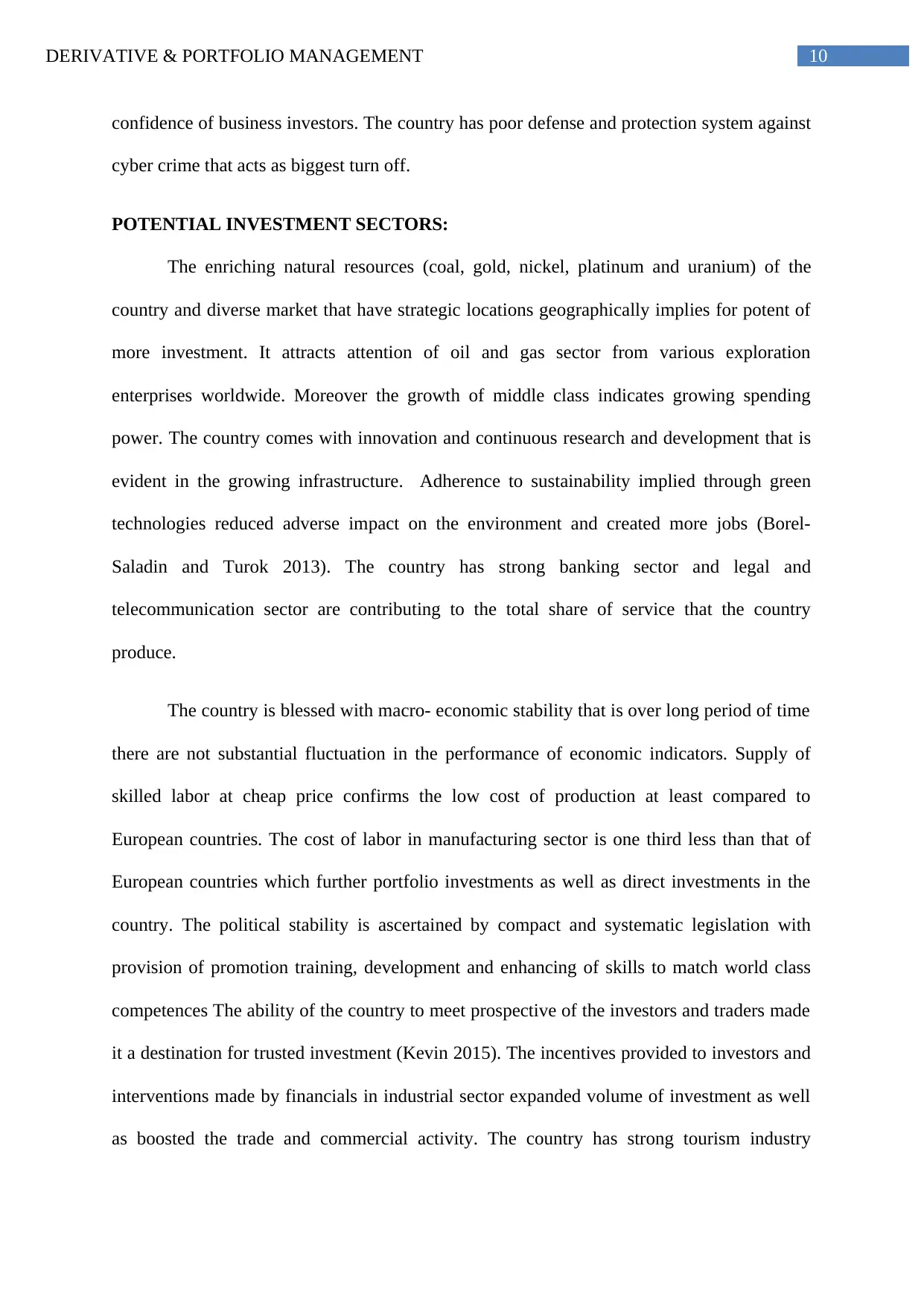
10DERIVATIVE & PORTFOLIO MANAGEMENT
confidence of business investors. The country has poor defense and protection system against
cyber crime that acts as biggest turn off.
POTENTIAL INVESTMENT SECTORS:
The enriching natural resources (coal, gold, nickel, platinum and uranium) of the
country and diverse market that have strategic locations geographically implies for potent of
more investment. It attracts attention of oil and gas sector from various exploration
enterprises worldwide. Moreover the growth of middle class indicates growing spending
power. The country comes with innovation and continuous research and development that is
evident in the growing infrastructure. Adherence to sustainability implied through green
technologies reduced adverse impact on the environment and created more jobs (Borel-
Saladin and Turok 2013). The country has strong banking sector and legal and
telecommunication sector are contributing to the total share of service that the country
produce.
The country is blessed with macro- economic stability that is over long period of time
there are not substantial fluctuation in the performance of economic indicators. Supply of
skilled labor at cheap price confirms the low cost of production at least compared to
European countries. The cost of labor in manufacturing sector is one third less than that of
European countries which further portfolio investments as well as direct investments in the
country. The political stability is ascertained by compact and systematic legislation with
provision of promotion training, development and enhancing of skills to match world class
competences The ability of the country to meet prospective of the investors and traders made
it a destination for trusted investment (Kevin 2015). The incentives provided to investors and
interventions made by financials in industrial sector expanded volume of investment as well
as boosted the trade and commercial activity. The country has strong tourism industry
confidence of business investors. The country has poor defense and protection system against
cyber crime that acts as biggest turn off.
POTENTIAL INVESTMENT SECTORS:
The enriching natural resources (coal, gold, nickel, platinum and uranium) of the
country and diverse market that have strategic locations geographically implies for potent of
more investment. It attracts attention of oil and gas sector from various exploration
enterprises worldwide. Moreover the growth of middle class indicates growing spending
power. The country comes with innovation and continuous research and development that is
evident in the growing infrastructure. Adherence to sustainability implied through green
technologies reduced adverse impact on the environment and created more jobs (Borel-
Saladin and Turok 2013). The country has strong banking sector and legal and
telecommunication sector are contributing to the total share of service that the country
produce.
The country is blessed with macro- economic stability that is over long period of time
there are not substantial fluctuation in the performance of economic indicators. Supply of
skilled labor at cheap price confirms the low cost of production at least compared to
European countries. The cost of labor in manufacturing sector is one third less than that of
European countries which further portfolio investments as well as direct investments in the
country. The political stability is ascertained by compact and systematic legislation with
provision of promotion training, development and enhancing of skills to match world class
competences The ability of the country to meet prospective of the investors and traders made
it a destination for trusted investment (Kevin 2015). The incentives provided to investors and
interventions made by financials in industrial sector expanded volume of investment as well
as boosted the trade and commercial activity. The country has strong tourism industry
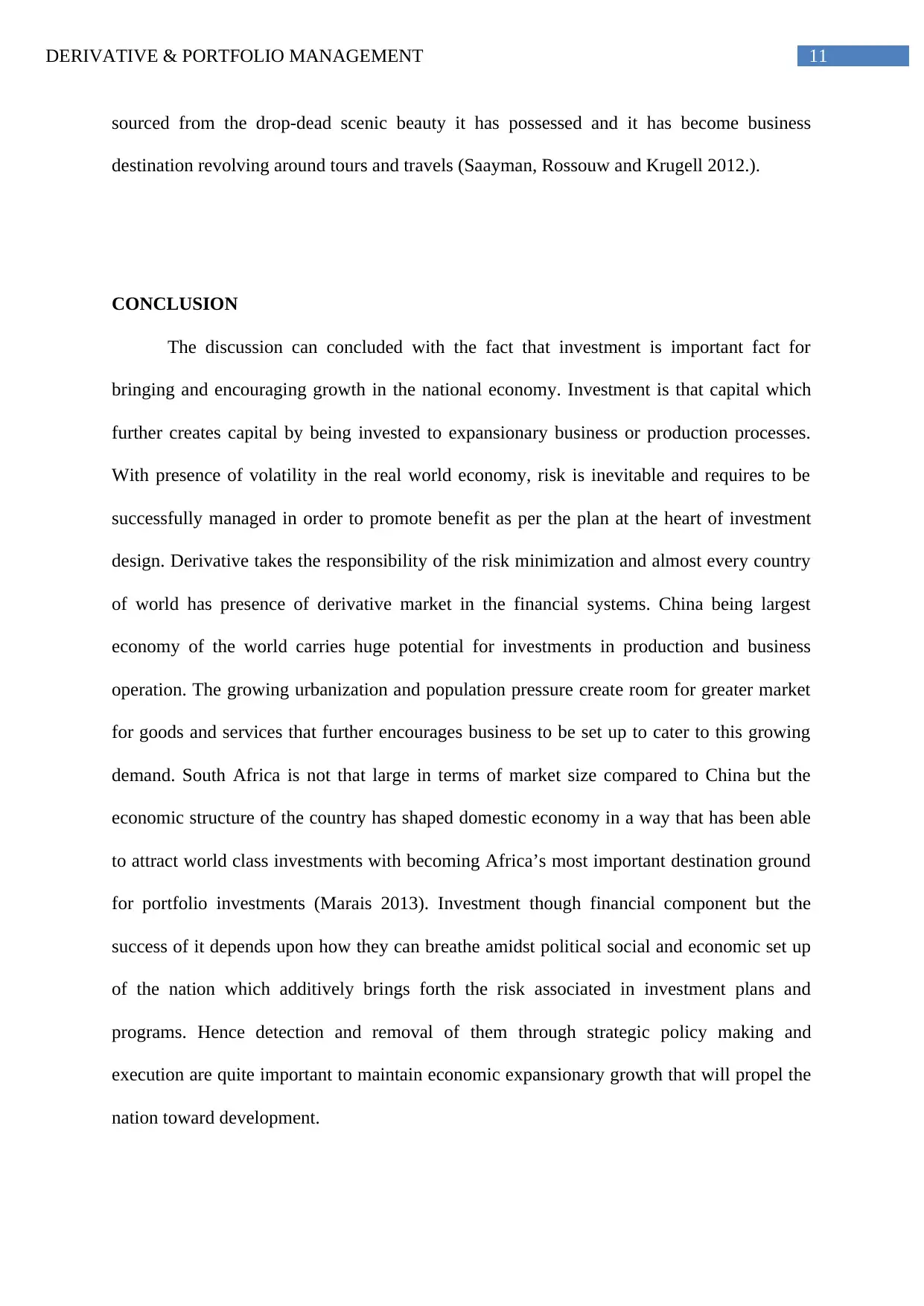
11DERIVATIVE & PORTFOLIO MANAGEMENT
sourced from the drop-dead scenic beauty it has possessed and it has become business
destination revolving around tours and travels (Saayman, Rossouw and Krugell 2012.).
CONCLUSION
The discussion can concluded with the fact that investment is important fact for
bringing and encouraging growth in the national economy. Investment is that capital which
further creates capital by being invested to expansionary business or production processes.
With presence of volatility in the real world economy, risk is inevitable and requires to be
successfully managed in order to promote benefit as per the plan at the heart of investment
design. Derivative takes the responsibility of the risk minimization and almost every country
of world has presence of derivative market in the financial systems. China being largest
economy of the world carries huge potential for investments in production and business
operation. The growing urbanization and population pressure create room for greater market
for goods and services that further encourages business to be set up to cater to this growing
demand. South Africa is not that large in terms of market size compared to China but the
economic structure of the country has shaped domestic economy in a way that has been able
to attract world class investments with becoming Africa’s most important destination ground
for portfolio investments (Marais 2013). Investment though financial component but the
success of it depends upon how they can breathe amidst political social and economic set up
of the nation which additively brings forth the risk associated in investment plans and
programs. Hence detection and removal of them through strategic policy making and
execution are quite important to maintain economic expansionary growth that will propel the
nation toward development.
sourced from the drop-dead scenic beauty it has possessed and it has become business
destination revolving around tours and travels (Saayman, Rossouw and Krugell 2012.).
CONCLUSION
The discussion can concluded with the fact that investment is important fact for
bringing and encouraging growth in the national economy. Investment is that capital which
further creates capital by being invested to expansionary business or production processes.
With presence of volatility in the real world economy, risk is inevitable and requires to be
successfully managed in order to promote benefit as per the plan at the heart of investment
design. Derivative takes the responsibility of the risk minimization and almost every country
of world has presence of derivative market in the financial systems. China being largest
economy of the world carries huge potential for investments in production and business
operation. The growing urbanization and population pressure create room for greater market
for goods and services that further encourages business to be set up to cater to this growing
demand. South Africa is not that large in terms of market size compared to China but the
economic structure of the country has shaped domestic economy in a way that has been able
to attract world class investments with becoming Africa’s most important destination ground
for portfolio investments (Marais 2013). Investment though financial component but the
success of it depends upon how they can breathe amidst political social and economic set up
of the nation which additively brings forth the risk associated in investment plans and
programs. Hence detection and removal of them through strategic policy making and
execution are quite important to maintain economic expansionary growth that will propel the
nation toward development.
⊘ This is a preview!⊘
Do you want full access?
Subscribe today to unlock all pages.

Trusted by 1+ million students worldwide
1 out of 17
Related Documents
Your All-in-One AI-Powered Toolkit for Academic Success.
+13062052269
info@desklib.com
Available 24*7 on WhatsApp / Email
![[object Object]](/_next/static/media/star-bottom.7253800d.svg)
Unlock your academic potential
Copyright © 2020–2026 A2Z Services. All Rights Reserved. Developed and managed by ZUCOL.





